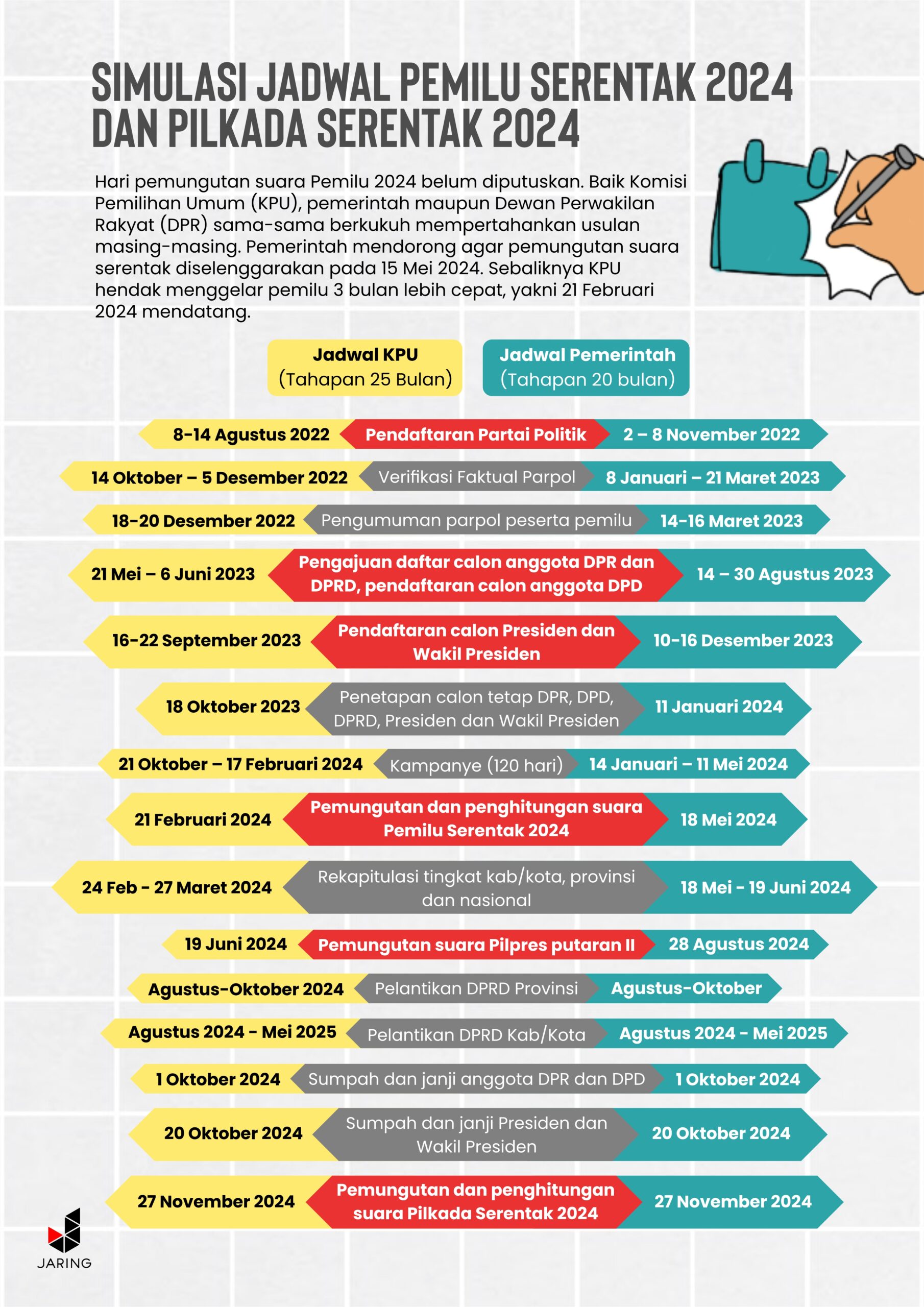The confirmation of the general election schedule is important to provide legal assurance for the implementation of the upcoming 2024 general election. However, two months before the end of this year, both the election organizers, the government and the House of Representatives (DPR) have not yet been agreed on an election schedule. The Election Commission (KPU) proposed February 21, 2024 as the voting day. On the other hand, the government prefers the peak of the national political contestation to be held in April or May 2024. The government considers the schedule prepared by the Election Comission to be inefficient because the election begins 25 months before the ballot or January 2022, and can have an impact on wasting the state budget. It is claimed that the length of the schedule for the stages will heat up the national and regional political temperature which can have a negative effect on security.
Meanwhile, the Election Commission considers the longer schedule of 5 months as the ideal time to start the stages. The reason is that the Election Commission needs time to carry out internal preparations. In the near future, the Commission will be faced with an agenda for changing commissioners, both the Commission and the Election Supervisory Agency (Bawaslu) at the central, provincial, and regency/city levels. According to a Commissioner of the General Election, I Dewa Kade Wiarsa Raka Sandi, the determination of the election voting schedule prepared by the Election Commission refers to the time limit that has been stated in writing in the legislation. In this case, the Commission needs to synchronize between the election agenda and the regional head elections.
In addition, the Election Commission does not want the election schedule to overlap with the stages of the regional election, resulting in the organizers’ workload becoming too heavy. The tragedy of the 2019 election, which has left 894 officers dying and more than 5100 others sick due to fatigue, requires the Commission to properly manage the workload of officers. “The Election Commission has concluded that February 21, 2024 is the most ideal for voting because there will not be many stages of the general election and regional elections that overlap,” he said when interviewed on Thursday, October 7, 2021.
The implementation of the 2024 simultaneous elections refers to Law Number 7 of 2017 concerning General Elections and Law Number 10 of 2016 concerning the Second Amendment to Law Number 1 of 2015 concerning Stipulation of Government Regulations in Lieu of Law Number 1 of 2014 concerning the Election to the Governors, Regents, and Mayors Become Laws. In the law, it is emphasized that the time limit related to the stages of the election is carried out 20 months before voting with the day and date of voting determined by the Election Commission..
Even so, a lawmaker of the Commission II of the Prosperous Justice Party (PKS) faction, Mardani Ali Sera, suggested that the government should not force the will to hold elections in the middle of 2024. According to him, the election schedule drawn up by the Election Commission had taken into account various things, including the internal conditions of the organization. “The Husnuz Zhan (Positive mind of this reasons) is to make the election more efficient. But still, have to be aware that other interests group maybe ridden up,” he said.
The General Secretary of the Asian Democratic Network, Ichal Supriadi, also warned of the tendency of governments in Southeast Asia to strengthen during the Covid-19 pandemic and several countries leading to becoming an authoritarian regime. According to him, the government has taken a large part in determining each policy without involving the wider community. For example in the ratification of the Omnibus Law in Indonesia. Despite being rejected by many activists, students and environmentalists, the government still ratified it into law. “This is happening in almost all of Asia. The government is using the pandemic situation to increase its power,” he said in an interview on Thursday, October 7, 2021.
Based on the 2020 Global Democracy Index issued by the Institute for Democracy and Electoral Assistance (IDEA), the Covid-19 pandemic has worsened the quality of democracy in a number of Asia Pacific countries. The IDEA Regional Director for the Asia Pacific, Leena Rikkila Tamang in a webinar some time ago said that the decline could be seen by the deepening of the democratic gap between government institutions and the strengthening of the authoritarian regime.
IDEA divides government regimes in the Asia Pacific region into five categories, namely high, medium, weak democracies, mixed regimes (democratic – authoritarianism), and authoritarian regimes. Based on the 2020 Global Democracy Index, Cambodia, Thailand, Vietnam, and Laos remain authoritarian states. Indonesia has dropped to a weak democratic quality country after 20 years of being in the medium democratic quality country category. Malaysia and Myanmar remain in countries with weak democratic qualities. Singapore is in the category of the mixed regime. Only the Philippines and Timor Leste are in the category of countries with moderate democratic quality. Meanwhile, there is no country in Southeast Asia that has a high quality of democracy.
Within this group, the countries that experienced the most significant decline in quality were Indonesia and the Philippines. According to Leena, the decline in the quality of Indonesia’s democracy occurred only in a short period of time, starting in 2020. Even though throughout 2015 – 2019 Indonesia’s position was still at the middle level. This decline in democracy is then considered to be able to affect the conduct of democratic and fair elections. “Electoral rules could be made to benefit the ruling group. Meanwhile, the freedom of civil society to oversee every policy-making process is also hampered by the pandemic,” Ichal said.








